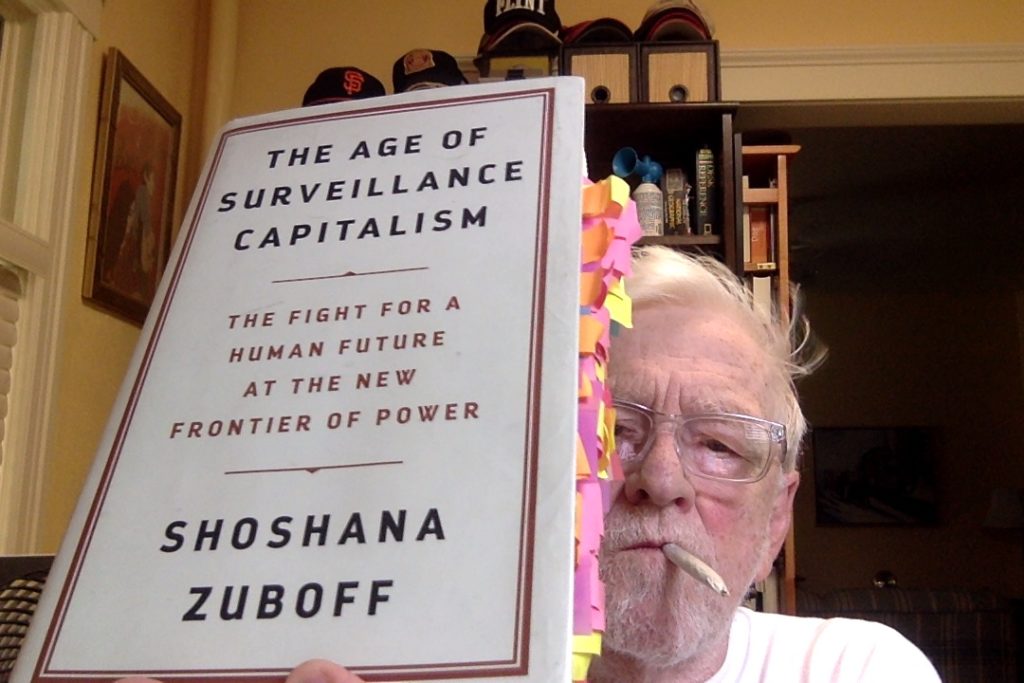By Robert R. Thomas
When entering foreign territories, orientation is the key to survival. Who is in charge? What are the rules? In her masterful analysis of the current state of global capitalism, The Age of Surveillance Capitalism: The Fight for a Human Future at the New Frontier of Power, Shoshana Zuboff, the Charles Edward Wilson Professor emerita at Harvard Business School, puts it like this:
“Who knows? Who decides? Who decides who decides?”
Like all ideologies, economic theories and systems reside on the shifting sands of change in a relative world and loads of general gibberish. Deified by Reagan and Thatcher back in the late-1970s, our system has been termed neoliberal, or “free” market, capitalism.
 Around the turn of this century, capitalism became “late-stage” neoliberal capitalism. In attempting to run to ground this addended version of our economic system, I fell upon Zuboff’s book to guide me through the history and the galumphing of our current economic state, which the author calls “surveillance capitalism.”
Around the turn of this century, capitalism became “late-stage” neoliberal capitalism. In attempting to run to ground this addended version of our economic system, I fell upon Zuboff’s book to guide me through the history and the galumphing of our current economic state, which the author calls “surveillance capitalism.”
The first page defines the term in eight shadings of meaning stemming from the first meaning: 1. A new economic order that claims human experience as free raw material for hidden commercial practices of extraction, prediction, and sales. The book is all about fleshing out this definition in its eightfold facets.
The introductory chapter asks whether we will be at home or in exile in the digital future. When the smart phone runs the operator, who is the bot and who is smart?
“Surveillance capitalism unilaterally claims human experience as free raw material for translation into behavior data,” Zuboff claims. “Although some of these data are applied to product or service improvement, the rest are declared as a proprietary behavioral surplus, fed into advanced manufacturing processes known as “machine intelligence,” and fabricated into prediction products that anticipate what you will do now, soon, and later.
“Finally, these prediction products are traded in a new marketplace for behavioral predictions that I call behavioral futures markets. Surveillance capitalists have grown immensely wealthy from these trading operations, for many companies are eager to lay bets on our future behaviour.”
Zuboff considers surveillance capitalism “a rogue force driven by novel economic imperatives that disregard social norms and nullify the elemental rights associated with individual autonomy that are essential to the very possibility of a democratic society.”
Threats to our humanity
As if those statements were not provocative enough, Zuboff doubles down:
“Just as industrial civilization flourished at the expense of nature and now threatens to cost us the Earth, an information civilization shaped by surveillance capitalism and its new instrumentation power will thrive at the expense of human nature and will threaten to cost us our humanity.”
The first part of her book addresses surveillance capitalism’s foundational framework and early elaborations by exploring the social conditions that summoned the digital into our everyday lives, which enabled surveillance capitalism to root and flourish. She describes the collision between the centuries-old historical processes of individualization that shape our experience as self-determining individuals and the harsh social habitat produced by a decades-old regime of neoliberal market economics in which our sense of self-worth and needs for self-determination are routinely thwarted.”
A detailed examination of surveillance capitalism’s invention and early elaboration follows.
“Google invented and perfected surveillance capitalism,” asserts the author, “in much the same way that a century ago General Motors invented and perfected managerial capitalism.”
In both systems, technology was a factor; but Zuboff firmly holds that “surveillance capitalism is not technology; it is a logic that involves technology and commands it into action.”
It “is both original and sui generis.” It “is a market form that is unimaginable outside the digital milieu, but it is not the same as digital.” It “cannot be adequately grasped with our existing concepts.”
Rocking and rolling with neoliberal economics
Zuboff’s scholarly diversity comes into full flower as she humanizes economics as a science and a reality by blending many diverse disciplines and historical periods in her narrative. Instead of presenting economic theory, she narrates what is happening in real time and its potential effects on humanity.
She adeptly rocks and rolls, economically and historically, through the theory and practice of neoliberal economics; predictive behavioral modification; Googlenomics and its secrecy factor; austerity economics; the most massive transfer of wealth to the top in history; and computer-mediated transaction, to name but a few.
The essence of Part I is revealing the “laws of motion” that drive surveillance capitalism. The unprecedented vast new asymmetries of knowledge and power that Google and an expanding field of competitors enjoy is best understood, according to Zuboff, “as the privatization of the division of learning in society, the critical axis of social order in the twenty-first century.”
The new, intrusive “reality business”
Part II, The Advance of Surveillance Capitalism, looks at what Zuboff describes as this new “reality business” in which surveillance capitalism migrates from the virtuality of the online experience to reality world. It is not simply passive data mining of the entire human experience; it is intrusively manipulative as well.
“As competition intensifies,” states Zuboff, “surveillance capitalists learn that extracting human experience is not enough. The most-predictive raw-material supplies come from intervening in our experience to shape our behavior in ways that favor surveillance capitalists’ commercial outcomes.” She examines the mass behavior modification elements of surveillance revenues as a challenge to self-determination, an essential condition of free will.
This section of the book concludes with insights into two questions: First, how did they get away with it? And second, if industrial capitalism dangerously disrupted nature, what havoc might surveillance capitalism wreak on human nature?
Surveillance capitalism’s reach and sheer power
Part III examines the rise of instrumentarian power of surveillance capitalism defined as “the instrumentation and instrumentalization of human behavior for the purposes of modification, prediction, monetization, and control.” Here again, Zuboff’s scholarly diversity shines as she introduces Totalitarianism and the Big Other to her big picture of surveillance capitalism’s reach and sheer power.
“Totalitarianism was a transformation of the state into a project of total possession,” defines Zoboff. “Instrumentarianism and its materialization in Big Other signal the transformation of the market into a project of total possession.” She explores the origins of instrumentation power by analyzing its intellectual origins in theoretical physics and later B.F. Skinner, the radical behaviorist.
From the first migration from the virtual to the real world, Zuboff sees the second phase change of surveillance capitalism “as a shift of focus from the real world to the social world, as a society itself becomes the new object of extraction and control.”
“Instrumentarian power aims to organize, herd, and tune society to achieve a similar social confluence,” states Zuboff, “in which group pressure and computational certainty replace politics and democracy, extinguishing the felt reality and social function of an individualized existence.”
An overthrow of human sovereignty
The book’s final chapter is an enlightening examination of the differences between surveillance capitalism and market capitalism. Along with demanding unimpeded freedom and total knowledge, “surveillance capitalism,” states Zuboff, “and its rapidly accumulating instrumentation power exceed the historical norms of capitalist ambitions, claiming dominion over human, societal, and political territories that range far beyond the conventional institutional terrain of the private firm or the market.
As a result, surveillance capitalism is best described as a coup from above, not an overthrow of the state but rather an overthrow of the people’s sovereignty and a prominent force in the perilous drift toward democratic deconsolidation that now threatens Western liberal democracies.”
Zuboff throws down the ultimate challenge to this unprecedented economic theory and practice: “If the digital future is to be our home, then it is we who must make it so.” Accepting her challenge warrants a mindful study of her analysis, which, in effect, addresses the three big questions that opened this review: “Who knows? Who decides? Who decides who decides?”
Who knows? Who decides? Who decides who decides?
For the timid reader who fears scholarly tomes and an interdisciplinary narrative, take a walk on the wild side with Shoshana Zuboff. Her insights into the three questions are well worth a little longer walk because her analysis is a wily tale engagingly-told and well-referenced with facts rather than ethereal ideological theory.

Robert R. Thomas
Avid reader, fearless book reviewer, former priest, former San Francisco cable car driver, and EVM board member Robert R. Thomas can be reached at capnz13prod@gmail.com.


You must be logged in to post a comment.